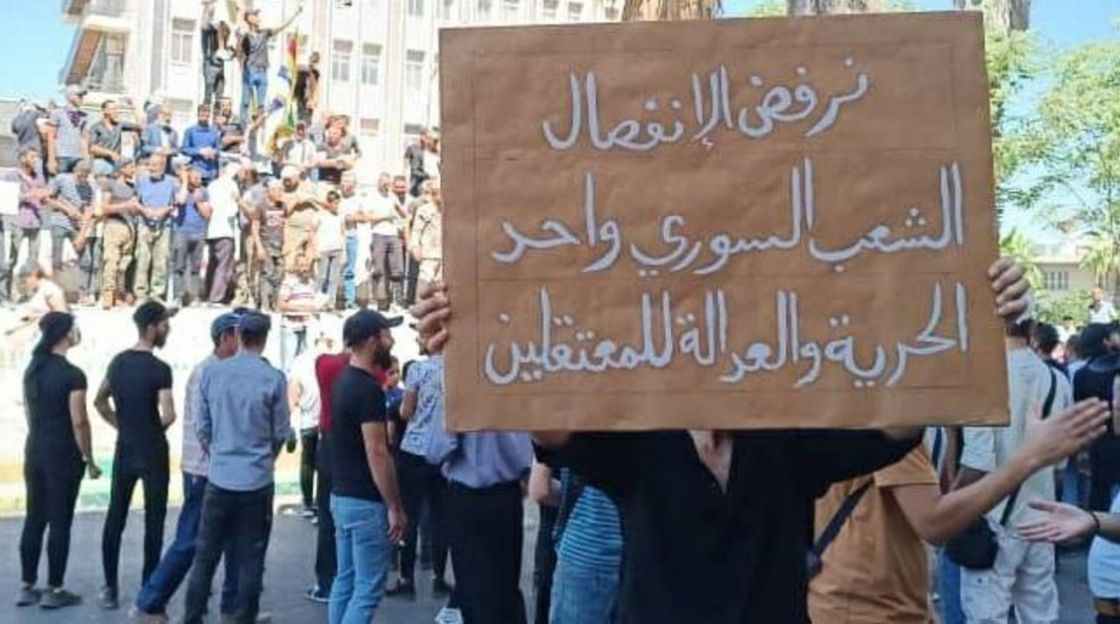- Editorials
- Posted
Kassioun Editorial 1137: The People’s Power in the Regions, How and When?
The new wave of the popular movement in Syria is still in its infancy, and possibilities are still open before it – the positive and the negative ones. This is the nature of things. That the movement develops peacefully and with just and rational slogans that bring together the plundered who are 90% of the population, this does not serve extremists in either the regime or the opposition. It also does not serve them that the movement gets rid of the processes of copying and pasting forms and slogans dating back to 2011. As such, those extremists encourage the preservation of those slogans and forms and highlight them.
The same goes for the historical enemies of Syria and Syrians, primarily the Zionist entity and the US, as well as the UK and France, who also are not served by the peaceful and patriotic development of the popular movement.
Therefore, it is not surprising that these sides exert their efforts to divide the people and strike them against each other, in an attempt to repeat the same previous scenario, even with developments that may be more dangerous.
What is good is that international, regional, and local conditions are more suitable than they were in 2011. This includes the general Western retreat, including the Zionist one, as well as the decline in the ability of extremists from various sides to mobilize and incite people, in addition to the fact that the degree of public awareness among the plundered is higher than it was in 2011.
One of the features of the high degree of public awareness is seeing the slogan of the political solution and the demand for the implementation of UNSC Resolution 2254. Also, among the important features that appeared, especially in the Suwayda governorate, is the widespread and categorical popular and political rejection of the slogans of “autonomous administration”, which is raised there by a limited, isolated, and well-known group. Therefore, those who carry this project are trying to circumvent the popular rejection by trying to pass the same idea in disguised forms, by talking about a border crossing with Jordan, military committees, and the like.
Attaining people’s power in the regions cannot be accomplished in any way without attaining people’s power in the center as well, at the same time and in parallel. In order for the people to be able to manage their affairs in the regions and monitor the state apparatus effectively, a proportionate and just distribution of resources, wealth, and powers must be achieved throughout the country. Experience says that there is no region in Syria capable of living on its own. Rather, the cases that tried to appear in a different way in their beginnings are proceeding with time towards replicating the model of centralizing wealth, power, and corruption within their regions.
The new formula required for the relationship between centralization and decentralization in the new Syria must achieve at the same time a strong center and strong periphery. Otherwise, the center will be fragile and the periphery will be more fragile, and the hollow claims by some entities about the need to “manage matters temporarily until a solution comes” will turn into a tool in preventing the solution and in opening the way to partition.
Building a new system in a Syria, whose people and territory are unified, cannot be done by “installments”. Rather, it must be done in bulk as one package. That is, through a comprehensive political solution that includes all of Syria and all Syrians based on UNSC Resolution 2254. Within this building process, and on new constitutional foundations, the power of the people is reinforced in the regions and the center, so that the center has the powers of defense, security, foreign affairs, monetary and financial policy, and comprehensive development. The regions would have the powers to monitor and hold state agencies accountable, economic and development powers, and administrative powers that include, among other things, the election of the governor and cultural powers.
Attempts to put the cart before the horse, i.e., preempting the comprehensive solution with “regional solutions”, will not lead to any solutions, neither regional nor comprehensive, and will hinder and delay the comprehensive solution. Such attempts would also serve those for whom partition is a way out, whether from the external or internal enemies. Therefore, holding on to a comprehensive political solution through UNSC Resolution 2254, protecting the popular movement and criticizing it from within continuously and consciously, and helping it to organize itself in a peaceful and patriotic manner, is the main gateway to getting Syria out of disaster that has befallen it, restoring its unity, and expelling foreign forces out of it.


